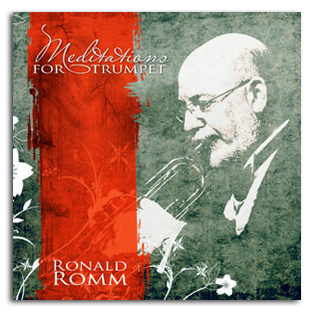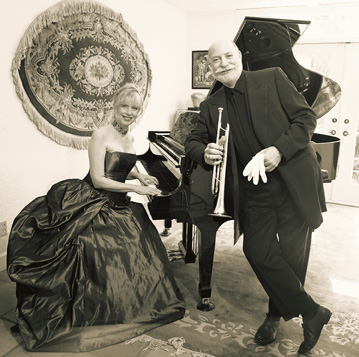Terrence London talks with Ronald Romm
Terrence London reviews music recordings for The Review and is author of articles and commentary on classical, jazz and other genres of music.
Ronald Romm is a former member of the ground-breaking Canadian Brass and is widely acknowledged as one of the pre-eminent trumpeters and clinicians of today
They recently sat down together and discussed his newest release – Meditations for Trumpet, available on Opening Day Records.
YOUR CAREER
Terrence London: Thanks for speaking with me. Let’s start at the beginning. Why did you pick the trumpet and how old were you when you first played?
Ronald Romm: The trumpet picked me. We always had music going on in our house; my mother was a classically trained clarinetist who became a saxophonist so as to be able to play dance jobs with my father, who was a drummer. My folks were enthusiastic music listeners and there was always music of varied styles playing on the radio or on the phonograph. We lived really close to the elementary school I attended so I would walk home for lunch. When I was about nine, I came home for lunch and heard these fantastic sounds coming out of the radio. I asked my mother “who is that?”, and she said “that’s Louis Armstrong, playing trumpet”, and I said “that’s what I want to do”.
TL: Who are your trumpet influences?
RR: Well, as I said, at the beginning there was Louis Armstrong, then of course I heard Harry James. More recently was Manny Klein and Doc Severinsen.
On the classical side, there was Bud Herseth in Chicago and Sam Kraus in Philadelphia, and then there was William Vacchiano in New York, with whom I eventually got to study. I listened to all kinds of musicians, though, and not just trumpeters. Often there was opera playing on the phonograph, so I heard lots of great singing. Maria Callas, Caruso, DiStefano, Pavarotti. Sometimes I heard Klezmer music on the radio…Mickey Katz. Great drummers, Gene Krupa, Jack Sperling, Buddy Rich and others. My first trumpet lessons were with my mother, so I learned to create a soft, clarinet sound. All of these musicians were great influences on my musical career, both as a performer and as a teacher.
TL: What was your immediate reaction to joining a brass quintet full time, considering this was unchartered territory for a brass player?
RR: I had had an interesting background already, growing up in Los Angeles in an eclectic music scene. My parents told me that music was music and I should learn all kinds of styles and make each style sound as though it was my favorite. One of my earlier teachers/mentors was Lester Remsen, who had a great affinity for brass chamber music. He had formed a quintet called the Los Angeles Brass ensemble, and when I was ready, he brought me in to the quintet to perform. I also had performed with the Los Angeles Brass Quintet, all members of the Los Angeles Philharmonic. When I moved to New York to go to Juilliard I formed a quintet that we called the New York Brass Society. We were all either in school at Juilliard, or just recently graduated and freelancing around town. Because of our work/school schedules, we rehearsed four nights a week from 11:00 PM until 02:00 AM. I also freelanced with other working brass quintets doing young persons’ concerts. Given my background and my interest in doing lots of different styles of music and loving the performing experience, the opportunity to join with Chuck and Gene [of the Canadian Brass], being on the leading edge of this career was much more exciting than daunting.
TL: Is it possible, out of all the albums that the Canadian Brass have made over the years, do you have a favorite?
RR: I have favorite pieces and favorite moments from literally each of the albums we made, but a favorite album per se, no. The fact that we traversed so many styles and created a fan base of great diversity is a testament to the span of our musical interest and a source of great pride for me.
TL: You were recently named one of the top 12 brass players of all-time by Brass Bulletin Magazine. Congratulations! Who would be in your top 5 list?
RR: Well of course it would have to be my colleagues from Canadian Brass.
TL: If you had the opportunity to work with another artist who would it be?
RR: I have given that question some thought and have some ideas as well as a few invitations already percolating. Since I haven’t yet done so, I would love to do an album with a great up-and-coming cellist…maybe a young version of Yo-Yo Ma or a young Fred Sherry. Interestingly, Avis and I have been developing a series of repertoire for live performance and recording along with our talented trumpet playing son, Aaron.
TL: What's on your iPod?
RR: I have a fairly diverse taste range, so I have some orchestral music, some Scriabin, some early Jazz, Chet Baker, some Johnny Cash, Horowitz piano music, some Puccini songs/opera material, some Wagner, some Canadian Brass and Boss Brass, and a bunch of music from the Universal catalogue.
ON PLAYING
TL: You play jazz very well, where did you learn to improvise and play that style, given your formal Juilliard training?
RR: Thanks; I don’t really consider myself a jazz player; I am conversant in some of the jazz styles. I can make my way around chord changes and have a database of perhaps 150-or-so tunes that we used to play in my family’s dance band, the Romm-Antics; I have a batch of “Fake Books (the legal ones)” that are fun to peruse. My mother used to remind me that I had to know the makeup of the pieces that I was playing… the style, the history, the form, the phrasing, the chord structure and the direction the music was taking. That encouraged me to learn how the music moved forward. This also created in me an intense interest in voice leading as I moved into the realm of chamber music performance and orchestral repertoire, as well as knowing and understanding the basic differences between the music of various periods, ornaments, trills, etc.
TL: Where do you find a place and the time to practice when you’re on the road?
RR: Practicing for any long duration on the road is nearly impossible. For me, my warm-up is essential; I use my warm-up as a diagnostic tool to highlight where I need to focus extra energy on the next setup/concert. That is not to say that I don’t practice, but efficiency and fast-tracking to top performance level is essential. I practice pretty much every day, and focus on clarity and beauty as the goal. I hear lots of great high, loud, fast trumpet playing, but not enough beauty.
TL: Playing in a brass quintet can be very taxing; do you have any advice or special tactics that improve endurance?
RR: Repetition of the repertoire will make performance easier, so “practice performing”…put yourself in performance mode anytime you pick up your instrument.
For me, remembering the fundamentals of good physical brass playing and a good emotional approach to the music will help to defeat extra fatigue. I need to remind myself that I am living and working in a gravity environment. The laws of physics are always with us and the body is self-regulating. Not to get too deeply into the pedagogy of brass playing, we need to remember just a few items:
- We can only do one thing at a time, so that thing should be to maximize the ease of playing.
- The mind that is controlling the body will do what it has to do to protect the body from damage, so if we lean backwards for example, while taking a breath or while playing, the mind senses that we are going to succumb to gravity and fall; the mind does an automatic protection setup to keep us from falling. This setup puts the body in a position where the muscles are doing isometric exercise rather than balanced breathing. The one thing that is being accomplished is protection from the fall. If we stay balanced while breathing (both inhalation and exhalation) we can then focus on the music.
Sounds complicated, but staying relaxed but focused while playing will help us to accomplish the musical goal without excess fatigue.



